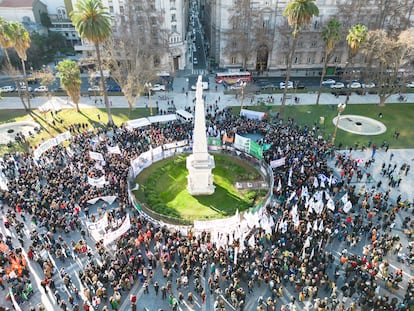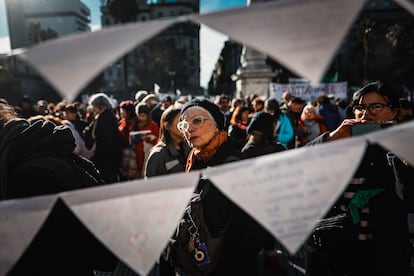There are 300 lives, 300 stories, 300 identities still missing and that the Grandmothers of Plaza de Mayo are still searching for. There are 300 grandchildren, according to estimates by human rights organizations, who are the children of victims of the last military dictatorship (1976-1983) who still need to be found. The public policies and institutions that have supported this search in Argentina for decades are now under threat of closure or defunding by the administration of Javier Milei. This Thursday, political, social, union and human rights organizations joined the traditional round of the Mothers of Plaza de Mayo, in front of the Casa Rosada, to protest against the denial measures of state terrorism promoted by the far-right government.
“Today we are here for our country, a beloved country that is being disregarded, offended by those who should be looking after us, but it will emerge from this shadow sooner rather than later,” said Estela de Carlotto, the president of Abuelas, who at 93 years old and with her cane in her right hand circled the Plaza de Mayo again, imitating the demonstration that was started 47 years ago by mothers who could not find their children kidnapped or murdered by the dictatorship.
“What we are seeing here today is a people who do not forget, a people who have a soul and heart with memory, who say and agree that they are 30,000 [los desaparecidos] “And we still need to find those who are alive, who are the grandchildren,” said Carlotto from the stage set up at one end of the square, on a cold winter afternoon in the city of Buenos Aires. She was met with applause and the usual cry: “Mothers of the square, the people embrace you!”
The main claim that the Grandmothers of Plaza de Mayo are making with this Thursday’s demonstration and with a petition that hopes to obtain international support is against a measure that the Government is preparing but has not yet implemented: an imminent decree from the Executive Branch would take away from the National Commission for the Right to Identity (Conadi) the power to investigate cases of appropriation of babies during the dictatorship and to access the archives of different areas of the State, a practice that has been uninterrupted for two decades.
“We are back here, to our protest site, where we help each other, with the struggle of almost 50 years on our backs for our missing persons, for our stolen babies, with an open heart, without violence, because the national government is destroying everything we have built for this search,” says the declaration of the Grandmothers, which was read this Thursday in Plaza de Mayo by the deputy Victoria Montenegro, a daughter of missing persons who recovered her identity in 2001. “Argentina’s human rights policies are admired by the whole world, which sees us as a country that was able to access the truth with exemplary trials, with concentration camps converted into spaces for memory, to educate the new generations in democratic values and so that the atrocious crimes committed by the terrorist State are not repeated,” the text adds and highlights: “No democratic government, until today, has questioned the search for missing children.”
“We cannot allow this”
To date, the Grandmothers of Plaza de Mayo have managed to recover the identity of 137 grandchildren. Guillermo Amarilla Molfino has been one of them since 2009, when he learned his real name after being born in captivity in 1980. “Within these three pillars of our history, which are memory, truth and justice, we are faced with a clear attack on memory. The judicial processes are still being upheld and we are the ones who uphold the truth, with this activism,” says Amarilla Molfino as he walks through the plaza. “We passed laws of Due Obedience, of Full Stop, and of the Law of the Right to Life. [normas que limitaban la responsabilidad de los militares en los crímenes]with the pardons and with the work of the Grandmothers, the Mothers, the organizations, this was reversed. These three elements necessary to form the history of our country, our own identity as a country, had to be maintained. Now we cannot allow everything worked on during the last 40 years to be erased,” he warns.
“I am looking for a brother or sister who should have been born in November 1977 with the Grandmothers,” says Esteban Lisandro Herrera Zimmerman during the round. “Today we are here defending not only the Conadi and its special investigation unit, which is a tool that allows the search for the grandchildren that we are missing, but also all public policies on human rights. The Secretariat of Human Rights is being dismantled by the layoffs, they are emptying entire areas.”

Paula Eva Logares was 23 months old in 1978 when she was kidnapped along with her parents, who remain missing. In 1984, she became the first grandchild to be recovered through a blood test as proof of parentage. This Thursday, from the Plaza de Mayo, she draws attention to the abandonment suffered by the sites of memory, where 50 workers have just been fired. “It took a long time to recognize them as such, in different trials and with different testimonies… If they are closed because there is no one to maintain them and enable them on a daily basis, that does not bring profit or anything positive to the State, there is no way to understand it as a positive issue,” says Logares.
General dismantling
In addition to threatening to block the search for children appropriated during the dictatorship, in its first months in office, Milei’s government has already dismantled the main human rights policies related to state terrorism. A combination of cuts in public funds, staff dismissals and the emptying of institutions has impacted programs linked to the prosecution of those responsible for crimes against humanity; the declassification of military and police archives; reparations for victims of state terrorism; and the preservation and expansion of memorials. A report by the Center for Legal and Social Studies (CELS) and the group of human rights organizations that make up Memoria Abierta reported on thi
s setback and detailed its different aspects.
Among other measures, the government “put an end to the work of the Document Analysis and Survey Team of the Armed Forces Archives” that had been operating in the Ministry of Defense since 2010 and whose contributions to the Justice Department were key to “understanding the structures and chains of command of the repressive system, as well as identifying military personnel involved in illegal actions,” the report states. Similarly, the Federal Intelligence Agency (AFI) discontinued the space created to analyze intelligence documentation linked to human rights violations. The Collective Memory and Social Inclusion Program (MECIS), which was dedicated to filming the hearings of trials for crimes against humanity throughout the country, was also dismantled. It had been created in 2009, based on a request from the Supreme Court of Justice to publicize these trials.

“The interruption of these public policies,” warn CELS and Memoria Activa, “occurs in the context of repeated statements by the President of the Nation, the Vice President [Victoria Villarruel] and various ministers against the justice process and in favor of the actions of the Armed Forces.”
In Argentina, there are forty memorial sites where concentration camps of the dictatorship operated. Since Milei took office, the National Directorate of Memorial Sites and Spaces has been vacant and the planned infrastructure works have been suspended. For CELS and Memoria Abierta, “the new government promotes a culture of contempt for the process of memory, truth and justice, while discarding the lessons learned in recent decades and stigmatizing the actors who have promoted and carried it out. As a society, this paradigm shift seeks to place us at the antipodes of what we have built since the recovery of democracy in 1983, under different governments and with the commitment of all the branches of the State.”
Subscribe here to the EL PAÍS América newsletter and receive all the key information on current affairs in the region.
#Mileis #government #threatens #search #children #stolen #dictatorship

